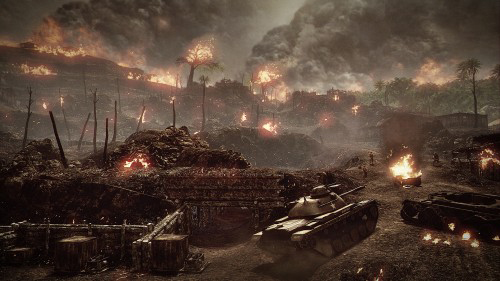
One of the maps in Battlefield: Bad Company 2 — Vietnam is called Hill 137, and it is likely inspired by the real-life battle for Hill 937, known as Hamburger Hill, in May 1969. The second set of objectives in Rush mode on that map are placed on a hill that has clearly been defoliated by a napalm strike. The ground is smoldering, with cinders floating up into the air while scattered fires still burn. As I drove up in a tank spraying Northern Vietnamese troops with its massive flamethrower, I found myself feeling very uncomfortable about the whole thing.
I started to think about the Vietnam veteran who 40 years later still wakes up screaming from a nightmare of his buddies being burned to death or blown up by booby traps; who still remembers being forced out into the field even though he’s burning with malaria, eating slop from a can with no trust in his officers and no respect for the Southern Vietnamese government he might be asked to die for, and being spit on by people when he finally returns home; and who now has to walk by a GameStop and see a poster advertising Battlefield Vietnam hanging in the window.
What’s the statute of limitations on basing a first-person shooter on a historical conflict? No one throws a fit when a World War 2 FPS title is made, and usually when I ask why I’m answered with various permutations of “It was so long ago that it isn’t relevant anymore."
And yet the haunting memories of Vietnam still burn brightly for many. It's estimated that around 850,000 American veterans who actually served in Vietnam are still alive today, and the youngest of them would be in their mid-50s. These are not old men convalescing in homes. If we want to speak plainly about the number of lives being directly touched by American wars in contemporary society, consider how many people the families of those 850,000 veterans might add up to?

Six Days in Fallujah, set during a recent conflict in Iraq, was dropped by Konami after mounting criticism, and Electronic Arts pulled the word “Taliban” from the multiplayer component of Medal of Honor, set in contemporary Afghanistan, due to fears of insensitivity. Critics felt that it was inappropriate to depict a fictional conflict in the context of a war which was still taking place. I can imagine that it would be difficult for a person who still has someone they love in harm’s way to see their loved one’s situation depicted as a fantasy for someone else to live “just for fun.” I get that the pain of the war on terror is ongoing and very fresh…but I’m not sure that pain is any more valid than that suffered by Vietnam veterans and their families.
Does the outrage against Fallujah and Medal of Honor rest on the argument that if the bullets are still flying, you cannot make the video game? By that logic, if all American combat troops are removed from Iraq and Afghanistan by the end of 2011, we can get back to Six Days in Fallujah for 2012. Or is it more about the emotional costs of a conflict still being suffered which demarcate the wars we can or cannot depict?

If that's the case, then consider that according to the Department of Defense, 1,771 souls are still missing in action in Southeast Asia. I find it difficult to dismiss Vietnam as “no longer relevant” when I take into consideration that there are still families missing their loved ones.
This column is not an argument that Battlefield Vietnam should not have been released. I likewise feel that Six Days in Fallujah should see the light of day. I think it’s important that video games try to tackle serious issues. While I stand by my belief that military first-person shooters should never even attempt to depict the brutal reality of modern warfare, there’s plenty of room for dramatic depiction and thematic investigation.
That’s one of the many purposes art serves. Perhaps if our country had actually learned the lessons Vietnam should have taught us – don’t go into a war unless you have an exit strategy – we wouldn’t have gone to Iraq in the first place, and a far lesser number than 5,841 (as of the date this column was published) would mark our dead in the current conflict.
When people tell me that World War 2 is “no longer as relevant,” perhaps that’s actually code for “I wasn’t alive when it happened, and therefore I have no context for it.” Plenty of people alive today have a lot of context for Vietnam, but I’ll be shocked if we see mainstream journalists waving advertisements for Battlefield Vietnam in the faces of ‘Nam widows and raising an uproar on Fox News. If there is some statute of limitations on when it’s okay to make a video game based on an actual war without worrying about anyone's sensitivities, I think that Vietnam, like the war on terror, still falls under it.


